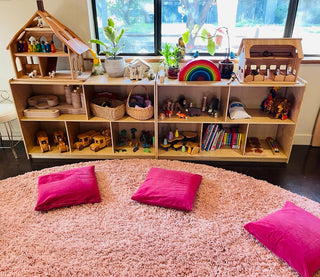COMING SOON
The future development of each individual child and of humanity as a whole depends on health-giving experiences in the first seven years of life. An atmosphere of loving warmth and guidance that promotes joy, wonder, and reverence supports such healthy development.
In our early childhood program, inspired by Walforf education, the foundations are laid for later learning and healthy development, including life-long physical, social, emotional, intellectual, and spiritual growth.
This education, based on an understanding of the development of human individuality, offers protection and respect for the dignity of childhood. It includes an understanding of the unfolding development of the child from pre-birth to seven.
Activities in Waldorf early childhood education take into consideration the
age-specific developmental needs of young children, from a focus on
will-oriented physical activity in the first three years, then on imaginative play in the middle years of early childhood, and later a more cognitive approach to learning after the child enters school.
Educational Principles:
- Loving interest in and acceptance of each child
- Opportunities for self-initiated play with simple play materials as the essential activity for young children. This is the young child’s work and makes it possible for them to digest and understand their experiences.
- Awareness that young children learn through imitation, through the experience of diverse sensory impressions, and through movement. Their natural inclination is to actively explore their physical and social environment. The surroundings offer limits, structure and protection, as well as the possibility to take risks and meet challenges.
- A focus on real rather than virtual experiences to support the child in forming a healthy relationship to the world. This is a no media environment.
- Artistic activities such as storytelling, music, drawing, painting, rhythmic games, and modeling that foster the healthy development of imagination and creativity.
- Meaningful practical work such as cooking, baking, gardening, handwork and domestic activity that provide opportunities to develop unfolding human capacities. Here the emphasis is on the processes of life rather than on learning outcomes.
- Predictable rhythms through the day, week and year that provide security and a sense of the interrelationships and wholeness of life. Seasonal and
other festivals are celebrated according to the cultural and geographical surroundings. - An understading of the importance of the inner attitude and development of the educator, who provides the example for the child’s imitation.
We recognize that healthy child development unfolds most fully in the
context of a community with healthy social relationships among parents,
teachers, and children. Waldorf educators strive to create such conscious, collaborative communities around the children in their care and see their activity as part of a worldwide cultural healing impulse.


